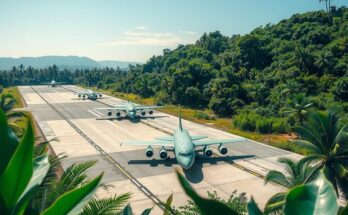Syria’s interim president, Ahmad al-Sharaa, visited Saudi Arabia on his first official trip abroad, indicating a strategic shift away from Iranian influence. Al-Sharaa’s governance aims to foster broader regional ties, especially with Saudi Arabia, as the country seeks economic recovery from years of conflict. However, challenges remain due to persistent threats from militancy and the need for international support to lift sanctions.
Syria’s interim president, Ahmad al-Sharaa, embarked on his first international visit to Saudi Arabia, signaling a potential shift in Syria’s diplomatic alignment away from Iran, its primary regional ally. Accompanied by Foreign Minister Asaad al-Shaibani, al-Sharaa’s trip represents a strategic move by Damascus, aiming to enhance relations with Riyadh after years of conflict. A photographic representation shared by the state-run SANA news agency highlights the significance of this visit, featuring both diplomats aboard a jet adorned with Saudi symbols.
Al-Sharaa’s visit not only signifies his inaugural trip abroad but also marks Saudi Arabia’s renewed engagement with Syria, following years of opposition against Bashar Assad’s regime during the Syrian civil conflict. While the kingdom previously supported insurgent factions opposing Assad, the dynamics shifted as Iranian and Russian backing hindered those efforts, leading to a stalemate. Al-Sharaa’s leadership stems from his role in Hayat Tahrir al-Sham (HTS), a group once linked to al-Qaida but which has since distanced itself from those ties and now seeks a reformed image.
In an effort to appeal to diverse Syrian demographics and international audiences alike, al-Sharaa has adopted a military aesthetic reminiscent of Ukraine’s President Zelenskyy, actively promoting inclusive governance by appointing women and attempting to foster ties with Syria’s Christian and Shiite communities. Furthermore, his administration seeks to navigate delicate relationships with Iran and Russia, with Iran yet to reopen its embassy in Damascus, and Russia trying to maintain strategic military access following the Syrian government’s retreat.
Saudi Arabia’s foreign minister, Prince Faisal bin Farhan, visited Syria earlier this year, signaling Riyadh’s proactive approach in fostering dialogue toward lifting international sanctions imposed on Syria. Unlike Turkey and Qatar, Saudi Arabia rekindled ties with Assad’s government, aiming to bolster economic cooperation and facilitate the reconstruction of Syria after over a decade of devastating conflict. These sanctions have critically hampered recovery efforts, necessitating extensive international collaboration for restoration.
Despite these diplomatic advancements, Syria’s interim government still contends with security threats from various militant factions, particularly the Islamic State group. Reports indicate an unfortunate rise in violence, including a recent car bombing in Manbij that resulted in civilian casualties. The ongoing presence of Turkish-backed Syrian rebels in the area complicates matters further, as Ankara seeks territorial control near its borders.
The Syrian civil war, which began in 2011, has generated a complex geopolitical landscape involving multiple actors and alliances. Ahmad al-Sharaa’s ascent as Syria’s interim president follows a period of chaos, fueled by both local protests and extensive foreign intervention. Al-Sharaa’s organization, HTS, previously affiliated with al-Qaida, has sought to redefine its identity while distancing itself from extremist ties. Concurrently, Saudi Arabia’s shift in diplomatic recognition reflects changing regional alliances and the gradual normalization of relations among Arab nations post-conflict. The economic challenges faced by Syria are exacerbated by sanctions imposed on it, compounding the need for reconstruction assistance and international support.
Ahmad al-Sharaa’s inaugural foreign visit to Saudi Arabia marks a critical juncture in Syria’s attempt to pivot away from Iranian influence and foster stronger relations with Gulf Arab nations. This diplomatic move, reflecting a wider realignment in regional politics, emphasizes the importance of dialogue and cooperation to alleviate Syria’s significant economic challenges. Nonetheless, the situation is still precarious, with ongoing security threats hindering the stabilization and reconstruction efforts essential for Syria’s future.
Original Source: apnews.com




